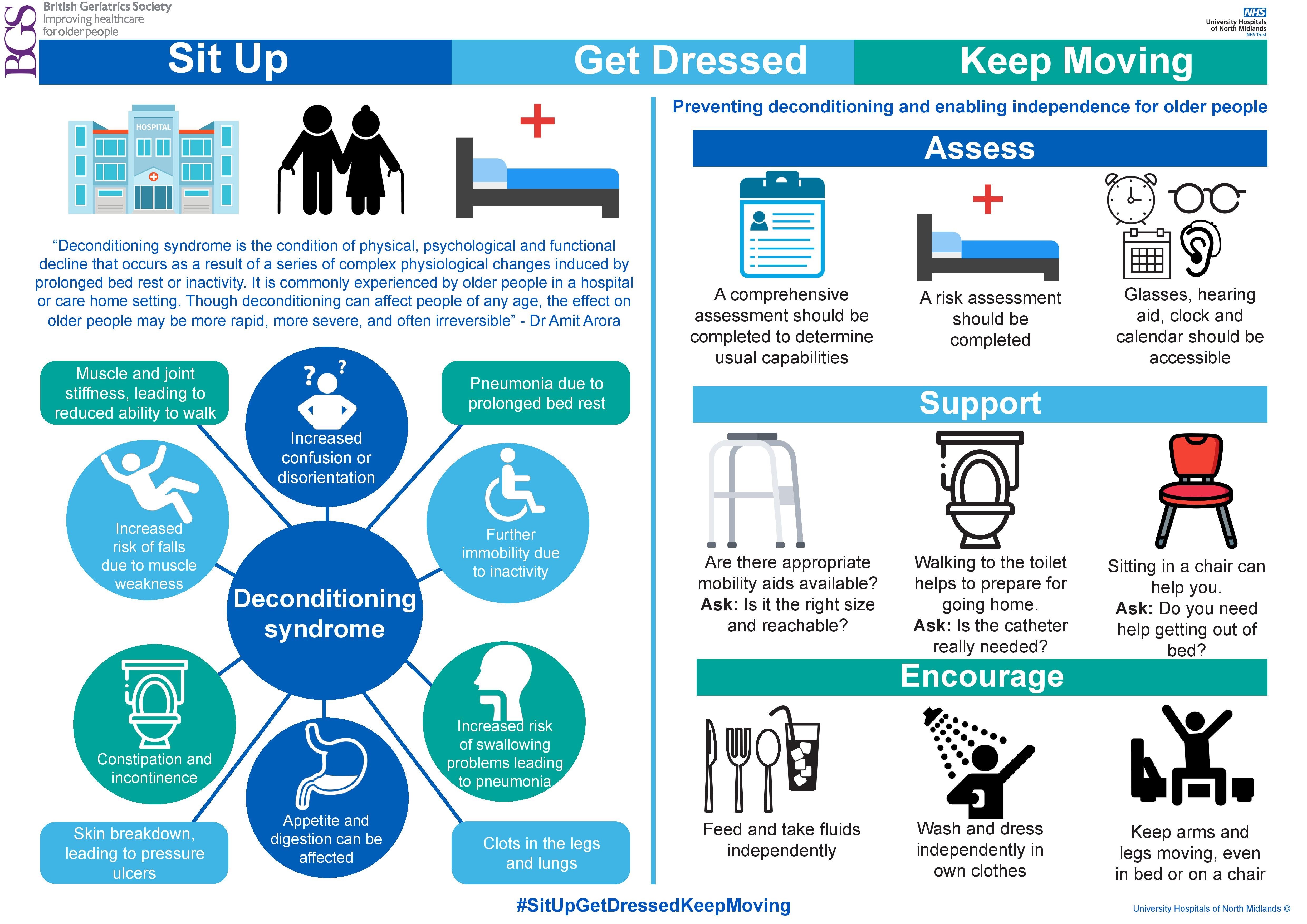Campaign relaunched to give healthcare professionals new resources to combat deconditioning in hospital
University Hospital of North Midlands (UHNM) and the British Geriatrics Society have relaunched the ‘Sit Up, Get Dressed and Keep Moving’ campaign which aims to help healthcare professionals recognise the long term effects of deconditioning, implement simple measures to prevent it, and educate patients and carers about the importance of remaining active during hospital admission and following discharge.
In recent years ‘deconditioning syndrome’ has gained increased recognition among the medical community, aided by ‘Sit Up, Get Dressed and Keep Moving’ and the related campaign #EndPJparalysis. Research has shown that during hospitalisation, between 30% and 55% of older patients show a decline in the ability to perform routine activities such as bathing, getting dressed and toileting, and up to 65% of hospitalised older adults experience a decline in ambulatory function. These changes can lead to a loss of independence and the need for residential care. Deconditioning syndrome is also associated with a variety of physiological effects including pneumonia, skin breakdown leading to pressure ulcers, constipation, incontinence, depression and an increased risk of falls.
As part of the campaign’s relaunch, a number of new ‘Sit Up, Get Dressed and Keep Moving’ resources have been created. These include an educational poster and pull-up banner for display in hospitals, a leaflet for patients explaining the benefits of staying active, and illustrated guides outlining chair and bed-based exercises aimed at maintaining and gaining muscle strength, improving blood circulation, helping mobility progression and supporting overall recovery. These resources are designed to be simple, accessible, and relevant to all health professionals regardless of role, specialty, or previous experience.
Dr Amit Arora, UHNM Consultant Geriatrician and his team launched the initiative in 2017 to try to stop older people becoming deconditioned in hospital and raise awareness of this under-recognised condition. In light of the lasting impact of the Covid-19 pandemic on NHS services, and evidence that maintaining physiological function and reserve can contribute to the fight against the mental and physical consequences and severity of the virus, it is more important than ever to encourage older people to ‘Sit Up, Get Dressed and Keep Moving’.
Dr Arora said: “Many years ago I was subject to restricted mobility following an emergency appendicectomy. It took me a surprisingly long time to regain my strengths and abilities. When I relate this to the frail older people that I see in hospitals, I can understand why someone who was able to function well before they came to hospital takes longer to regain their functions.
“A prolonged hospital stay, bed rest and general lack of movement can lead to loss of muscle power, strength and abilities. Of course there are times and conditions when bed rest would be advisable; but more often than not, this is not the case in the strictest terms. Deconditioning can start within hours of immobility. We need to get our patients up as quickly as possible, while being careful not to overload them.”
He added: “Under the guidance of therapists, it can be done by ward-based staff - it’s ‘everyone’s business’ to get involved in restoring normalcy.”
Professor Tahir Masud, President of the British Geriatrics Society, commented:
We are delighted to relaunch the ‘Sit Up, Get Dressed and Keep Moving’ campaign in collaboration with Dr Amit Arora and his team at University Hospital of North Midlands. Since this campaign was first launched three years ago it has been incredibly successful in raising awareness of ‘deconditioning syndrome’ and its association with poorer health outcomes for our older patients. Building on this past success, the ‘Sit Up, Get Dressed and Keep Moving’ campaign’s relaunch will ensure that an even greater number of doctors, nurses and allied health professionals recognise the importance of preventing deconditioning and have the tools they need to enable older patients to stay active in hospital and following discharge.”
Follow and share the campaign on Twitter via #SitUpGetDressedKeepMoving
